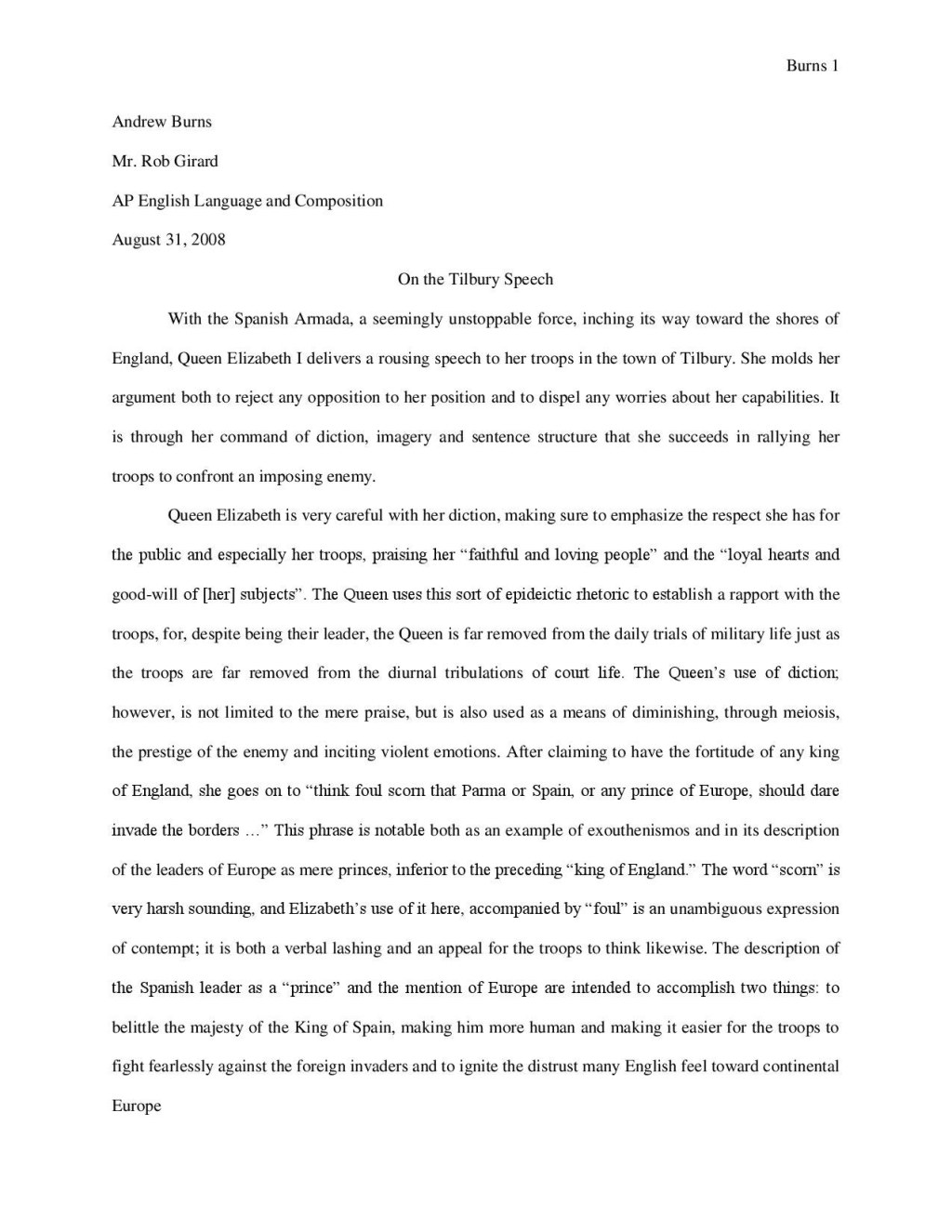Unveiling Queen Elizabeth’s Powerful Speech To The Troops At Tilbury: A Profound Analysis That Commands Action
Queen Elizabeth Speech to the Troops at Tilbury Analysis
Greetings, Queen Elizabeth admirer! In this article, we will delve into the analysis of Queen Elizabeth’s famous speech to the troops at Tilbury. This historic speech, delivered in 1588, showcases the queen’s leadership and determination during a pivotal moment in English history. Join us as we explore the key elements of her speech and its lasting impact.
Introduction
In this section, we will provide an overview of Queen Elizabeth’s speech to the troops at Tilbury. We will discuss the historical context, the purpose of the speech, and the significance of this event in English history.
1 Picture Gallery: Unveiling Queen Elizabeth’s Powerful Speech To The Troops At Tilbury: A Profound Analysis That Commands Action

The speech was delivered by Queen Elizabeth I on August 9, 1588, as the Spanish Armada threatened to invade England. The Spanish Armada was a formidable naval fleet sent by King Philip II of Spain to dethrone Queen Elizabeth and restore Catholicism in England. Faced with this imminent threat, Queen Elizabeth addressed her troops at Tilbury, urging them to stand strong and defend their country.
The queen’s speech aimed to boost the morale of her troops, instill a sense of patriotism and loyalty, and rally them for battle. It was a pivotal moment in English history, as the defeat of the Spanish Armada marked a turning point in the power struggle between England and Spain.

Image Source: isu.pub
Now, let’s delve into the details of Queen Elizabeth’s speech and analyze its key components.
What: Queen Elizabeth’s Speech to the Troops at Tilbury
In this section, we will explore the content and themes of Queen Elizabeth’s speech. We will examine the key messages conveyed by the queen and analyze the rhetorical devices used to captivate her audience.
The main purpose of Queen Elizabeth’s speech was to inspire her troops and boost their morale in the face of the impending Spanish invasion. She emphasized the unity and strength of the English nation and highlighted the importance of their duty to defend their homeland.
Queen Elizabeth’s speech is known for its powerful imagery and skillful use of rhetoric. She begins by acknowledging the doubts and fears of her troops, assuring them that she shares their burdens. She then emphasizes her unwavering commitment to their cause and her confidence in their ability to overcome the Spanish threat.
The queen employs metaphors and vivid language to convey her message. She compares herself to a weak and feeble woman on the outside but asserts that she possesses the heart and stomach of a king. This metaphorical language serves to evoke a sense of strength and determination, encouraging her troops to emulate her resilience.
Furthermore, Queen Elizabeth appeals to the patriotism and loyalty of her troops by reminding them of the long history of English victories and the honor that awaits them if they succeed. She invokes the spirit of their ancestors and reminds them of the great responsibility they bear as defenders of their nation.
Overall, Queen Elizabeth’s speech effectively communicates her unwavering determination, instills a sense of national pride, and motivates her troops to fight for their country.
Who: Queen Elizabeth and the Troops at Tilbury
In this section, we will delve into the key figures involved in Queen Elizabeth’s speech and their significance in the historical context.
Queen Elizabeth I, also known as the Virgin Queen, was the reigning monarch of England at the time. She was a highly influential and respected leader, known for her intelligence, political acumen, and strong will. Her speech at Tilbury showcased her leadership skills and her ability to rally her troops during a critical moment.
The troops at Tilbury consisted of a diverse range of soldiers, including seasoned veterans and newly recruited volunteers. They were united by their loyalty to Queen Elizabeth and their commitment to defend their homeland. The speech served as a unifying force, galvanizing the troops and fostering a sense of camaraderie and purpose.
It is important to note that Queen Elizabeth’s speech was not only intended for the troops at Tilbury but also for the wider audience. Her words were likely disseminated through various channels, reaching both the military and civilian population. This ensured that her message of unity, strength, and patriotism resonated throughout England.
When: August 9, 1588
In this section, we will discuss the timing and historical context of Queen Elizabeth’s speech.
Queen Elizabeth delivered her speech on August 9, 1588, during the Spanish Armada crisis. The Spanish Armada, a fleet of 130 ships, had set sail from Spain with the intention of invading England and overthrowing Queen Elizabeth.
The threat of invasion had been looming for months, and tensions were high. The Spanish Armada was considered nearly invincible, and the English were vastly outnumbered. Queen Elizabeth’s speech served as a rallying cry, galvanizing her troops and inspiring hope in the face of adversity.
The timing of the speech was crucial, as it occurred just before the English fleet engaged in battle with the Spanish Armada. Queen Elizabeth’s words provided the necessary encouragement and reassurance to her troops, boosting their morale and preparing them for the impending conflict.
Where: Tilbury, England
In this section, we will explore the significance of Tilbury as the location for Queen Elizabeth’s speech.
Tilbury is a small town located on the River Thames in Essex, England. It was strategically chosen as the assembly point for the English troops due to its proximity to London, the capital city.
Queen Elizabeth rode to Tilbury to personally address her troops, demonstrating her commitment and dedication to their cause. The choice of Tilbury as the location for the speech further emphasized the importance and urgency of the situation.
The speech took place on a field at Tilbury, where the troops were gathered in preparation for battle. Queen Elizabeth’s presence and words of encouragement served to boost their morale and reaffirm their mission to defend their country.
Why: The Significance of Queen Elizabeth’s Speech
In this section, we will discuss the significance of Queen Elizabeth’s speech and its lasting impact.
Queen Elizabeth’s speech to the troops at Tilbury holds immense historical significance. It is regarded as a defining moment in English history and a testament to the queen’s leadership and resilience.
The speech served as a rallying cry for the English troops, inspiring them to fight against overwhelming odds. Queen Elizabeth’s words instilled a sense of national pride and unity, forging a collective spirit that enabled the English to triumph over the Spanish Armada.
Furthermore, the speech solidified Queen Elizabeth’s reputation as a strong and capable leader. Her unwavering commitment to her troops and her country garnered admiration and loyalty from her subjects. Her words continue to resonate today, symbolizing the enduring spirit of determination and resilience in the face of adversity.
How: Analyzing Queen Elizabeth’s Speech
In this section, we will analyze the rhetorical devices and techniques used by Queen Elizabeth in her speech.
Queen Elizabeth employed various rhetorical devices to captivate her audience and convey her message effectively. These devices include metaphors, imagery, repetition, and appeals to emotion.
One of the notable rhetorical devices used in the speech is metaphor. Queen Elizabeth compares herself to a weak woman on the outside but asserts her inner strength and determination. This metaphor serves to inspire her troops, urging them to embody her resilience and fight for their country.
Queen Elizabeth also utilizes vivid imagery to paint a powerful picture in the minds of her audience. For example, she speaks of my loving people and describes their tears as a sweet sacrifice. Such imagery evokes a sense of empathy and unity, fostering a strong emotional connection between the queen and her troops.
Repetition is another rhetorical device used by Queen Elizabeth. She repeatedly emphasizes her unwavering commitment to her troops and her confidence in their ability to overcome the Spanish Armada. This repetition serves to reinforce her message and instill a sense of conviction in her audience.
Lastly, Queen Elizabeth appeals to the emotions of her troops by invoking a sense of national pride and honor. She reminds them of the glorious victories of their ancestors and the great responsibility they bear as defenders of their nation. This appeal to emotion serves to motivate and inspire her troops, fostering a strong sense of patriotism and loyalty.
Advantages and Disadvantages of Queen Elizabeth’s Speech
In this section, we will examine the advantages and disadvantages of Queen Elizabeth’s speech to the troops at Tilbury.
Advantages:
Boosted morale: The speech effectively boosted the morale of the English troops, instilling a sense of pride, unity, and determination.
Inspiration: Queen Elizabeth’s words inspired her troops to fight against overwhelming odds, fostering a collective spirit of resilience.
Symbol of leadership: The speech solidified Queen Elizabeth’s reputation as a strong and capable leader, garnering admiration and loyalty from her subjects.
Rallying cry: The speech served as a rallying cry for the English troops, motivating them to defend their country against the Spanish Armada.
Historical significance: Queen Elizabeth’s speech is regarded as a defining moment in English history, symbolizing the triumph of the English over the Spanish Armada.
Disadvantages:
Limited impact: While the speech boosted the morale of the English troops, its direct impact on the outcome of the battle is difficult to ascertain.
Propaganda: The speech can be seen as a form of propaganda, aimed at promoting Queen Elizabeth’s image and rallying support for her cause.
Historical perspective: Some critics argue that the speech is romanticized in historical accounts, overshadowing other factors that contributed to the English victory.
Exclusion of dissenting voices: The speech primarily targeted the English troops, excluding opposing viewpoints and dissenting opinions.
Gender bias: Queen Elizabeth’s emphasis on her gender in the speech can be seen as reinforcing traditional gender roles and expectations.
FAQs (Frequently Asked Questions)
1. Did Queen Elizabeth actually deliver the speech at Tilbury?
Yes, Queen Elizabeth I personally delivered the speech to her troops at Tilbury.
2. Was the Spanish Armada successfully defeated after the speech?
Yes, the English fleet successfully defeated the Spanish Armada, marking a significant victory for England.
3. What were the key themes of Queen Elizabeth’s speech?
The key themes of the speech include unity, strength, patriotism, and the duty to defend one’s country.
4. How did Queen Elizabeth use rhetorical devices in her speech?
Queen Elizabeth used metaphors, imagery, repetition, and appeals to emotion to effectively convey her message and inspire her troops.
5. How has Queen Elizabeth’s speech influenced English history?
Queen Elizabeth’s speech is regarded as a pivotal moment in English history, symbolizing the triumph of the English over the Spanish Armada and solidifying her reputation as a strong and capable leader.
Conclusion
In conclusion, Queen Elizabeth’s speech to the troops at Tilbury holds immense historical significance. It showcased her leadership skills, inspired her troops, and solidified her reputation as a strong and capable leader. The speech served as a rallying cry, boosting the morale of the English troops and instilling a sense of national pride and unity. Its impact on the outcome of the battle against the Spanish Armada is difficult to ascertain, but its lasting legacy as a symbol of determination and resilience remains. Queen Elizabeth’s speech continues to inspire and captivate audiences, reminding us of the power of words in times of adversity.
Disclaimer: The information presented in this article is based on historical records and interpretations. While every effort has been made to ensure accuracy, some details may be subject to varying historical perspectives.
This post topic: Queen Elizabeth

